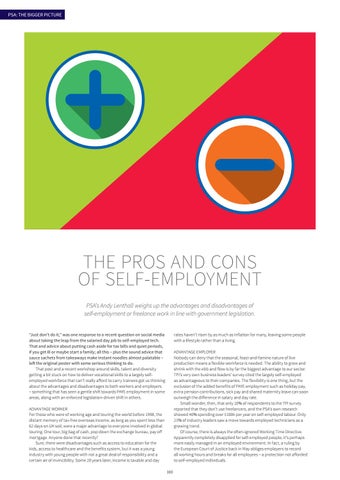PSA: THE BIGGER PICTURE
THE PROS AND CONS OF SELF-EMPLOYMENT PSA’s Andy Lenthall weighs up the advantages and disadvantages of self-employment or freelance work in line with government legislation. “Just don’t do it,” was one response to a recent question on social media about taking the leap from the salaried day job to self-employed tech. That and advice about putting cash aside for tax bills and quiet periods, if you get ill or maybe start a family; all this – plus the sound advice that sauce sachets from takeaways make instant noodles almost palatable – left the original poster with some serious thinking to do. That post and a recent workshop around skills, talent and diversity getting a bit stuck on how to deliver vocational skills to a largely selfemployed workforce that can’t really afford to carry trainees got us thinking about the advantages and disadvantages to both workers and employers – something that has seen a gentle shift towards PAYE employment in some areas, along with an enforced legislation-driven shift in others.
rates haven’t risen by as much as inflation for many, leaving some people with a lifestyle rather than a living. ADVANTAGE EMPLOYER Nobody can deny that the seasonal, feast-and-famine nature of live production means a flexible workforce is needed. The ability to grow and shrink with the ebb and flow is by far the biggest advantage to our sector. TPi’s very own business leaders’ survey cited the largely self-employed as advantageous to their companies. The flexibility is one thing, but the exclusion of the added benefits of PAYE employment such as holiday pay, extra pension contributions, sick pay and shared maternity leave can soon outweigh the difference in salary and day rate. Small wonder, then, that only 10% of respondents to the TPi survey reported that they don’t use freelancers, and the PSA’s own research showed 40% spending over £100k per year on self-employed labour. Only 23% of industry leaders saw a move towards employed technicians as a growing trend. Of course, there is always the often-ignored Working Time Directive. Apparently completely disapplied for self-employed people, it’s perhaps more easily managed in an employed environment. In fact, a ruling by the European Court of Justice back in May obliges employers to record all working hours and breaks for all employees – a protection not afforded to self-employed individuals.
ADVANTAGE WORKER For those who were of working age and touring the world before 1998, the distant memory of tax-free overseas income, as long as you spent less than 62 days on UK soil, were a major advantage to everyone involved in global touring. One tour, big bag of cash, pop down the exchange bureau, pay off mortgage. Anyone done that recently? Sure, there were disadvantages such as access to education for the kids, access to healthcare and the benefits system, but it was a young industry with young people with not a great deal of responsibility and a certain air of invincibility. Some 20 years later, income is taxable and day 103























